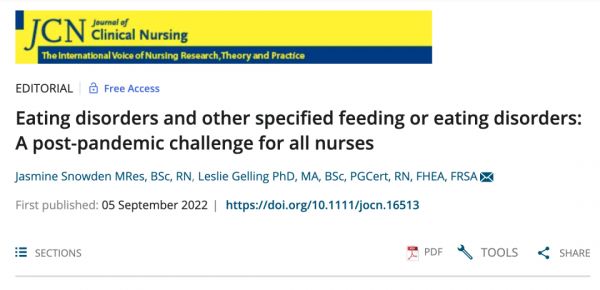进食障碍和其他特定的喂养或进食障碍:对所有护士的大流行后挑战

Full text
The COVID-19 pandemic has impacted the lives of very many people in different ways around the world. The impact of the pandemic on delaying cancer diagnosis and subsequent treatment has been well-documented but the pandemic has also had significant consequences for many other patient groups experiencing a wide variety of life-changing and potentially life-ending conditions. In this editorial, the focus will be on the pandemic's impact on individuals experiencing Eating Disorders and Other Specified Feeding or Eating Disorders (OSFED). This is an important issue for all nurses because eating disorders are currently the leading cause of death amongst individuals experiencing mental ill-health.
An eating disorder is a diagnosable mental illness characterised by an obsession with food, either eating too little or too much. Individuals experiencing an eating disorder often use food as a response to intrusive thoughts, which might be around size and shape of food or could be about fear of some types of food, such as carbohydrates or fats. Some individuals might even experience hallucinations and reduced cognitive function related to their eating disorder. OSFED sits on a spectrum somewhere between ‘normal eating’ and an ‘eating disorder’ and can be characterised by behaviours such as restrictive eating, binge eating, skipping meals, avoiding food groups, use of diet pills or laxatives and self-induced vomiting. The consequences of OSFED eating can be as serious as eating disorders. Eating disorders and OSFED can lead to serious and life-threatening physical and psychological side effects and, in a significant number of cases, to death.
During and after the COVID-19 pandemic, the prevalence of eating disorders and OSFED eating have grown substantially. This has resulted in increasing demands on many health services in mental health care, primary health care and in general hospital services. Perhaps the biggest challenge is outside mental health where there might already be a significant lack of focus on mental health or where there might be a lack of knowledge and experience around the presentation and management of eating disorders, or the communication skills required to support individuals presenting with eating disorders. Emergency departments, acute medical wards and paediatric wards are examples of extremely busy clinical areas where the multiple demands on nurses, lack of knowledge and experience of caring for people with eating disorders and lack of resources can increase the demands placed in nurses and can result in inadequate care for individuals seeking support for eating disorders (Rodgers et al., 2020).
There needs to be a shift in thinking about how individuals presenting with eating disorders are supported in hospital settings. It is important that all nurses have an understanding of eating disorders, so they are able to provide appropriate care and support to the growing number of individuals requiring this support, wherever it is needed.
The nursing care provided for individuals with eating disorders is highly specialised and draws on unique knowledge and understanding. Individuals with eating disorders might need to have their food intake carefully monitored, which can create challenges if they are being cared for in the wrong environment or are being cared for by nurses who lack the necessary knowledge and experience. Individuals with eating disorders may also undertake compensatory behaviours, such as over-exercising, purging or using laxatives, if they feel guilty about the food they have consumed. Again, ensuring adequate and accurate monitoring can be challenging.
Nurses familiar with caring for individuals with eating disorders will be aware of the need to maintain clear and consistent boundaries. Establishing and maintaining these boundaries can be difficult in acute care settings. Clear communication between all those involved in providing care for people with eating disorders, including their families, can also be challenging in the wrong clinical area or where those providing support lack knowledge and experience.
Nurses unfamiliar with caring for individuals with eating disorders might unintentionally use inappropriate terminology, such as ‘you are looking healthier’, which can have a detrimental impact on future behaviour (Beat Eating Disorders, 2022). It is important to remember that individuals who are recovering from an eating disorder are continuously battling intrusive thoughts about their intake, body image and self-esteem. A one seemingly positive comment from a healthcare practitioner can have negative implications for the individual involved.
Without knowledgeable and experienced support in an appropriate clinical environment, efforts to support individuals with eating disorders may not be as effective as they might otherwise be. The consequences of inadequate support can be devastating, including serious mental and physical health complications and even death. It is important, therefore, that all nurses, regardless of area of practice, acquire some knowledge and understanding of eating disorders and OSFED. This could be achieved through e-learning, in-house training and annual updates. Nurses will already be familiar with multiple annual training activities but, with the possible exception of resuscitation training, it is unlikely that any other annual training might have a positive impact on so many lives. As the number of individuals needing this support increases, so does the imperative to ensure that nurses everywhere have the knowledge and skills required.
The COVID-19 pandemic had an immense impact on all aspects of everyday life with many people having to drastically change their usual daily routines. The impact of making such changes to everyday life was felt not only by those with existing mental health illnesses but also by those without existing mental health challenges, many of whom adopted maladaptive coping mechanisms around eating in an attempt to retain a sense of control.
Throughout the United Kingdom (UK) those most affected were children, young people, those already experiencing emotional dysregulation and those with a known eating disorder. These individuals appear to have been most affected because of the high levels of stress and uncertainty caused by the pandemic and limitations imposed on them (Sideli et al., 2021). One of the most important limitations faced by children and young people was the immediate shift to online learning in schools, colleges and universities. Overnight, many children and young people were deprived of important support networks and contact with friends. This impact has also been seen in similar groups around the world but most obviously in higher income countries.
As health services around the world responded to new and significant challenges in delivering healthcare, many hospital appointments were cancelled or moved online. For some, this meant that opportunities for early intervention were missed and for others ongoing support was restricted and less effective. In the UK, referrals have increased as COVID-19 restrictions were lifted, with 10,000 children and young people starting interventions for eating disorders between April and December 2021 (Solmi et al., 2021). This is an increase of two-thirds since COVID-19 restrictions were in place.
A further complication is that many eating disorders and OSFED service users, including children, young people and adults, are being managed in physical health teams and settings. This is not the right environment because there is a danger that a lack of experienced mental health input could result in a further decline in an individual's mental health. As part of the NHS Implementation Plan in the UK, there will be an opportunity to review the current provision of mental health care outside mental health care settings and how such services are resourced (National Health Service, 2019). People needing support and intervention for eating disorders need specialised support from knowledgeable practitioners that might not always be available in general hospital settings.
The COVID-19 pandemic has resulted in an increase in eating disorders and OSFED around the world. As a consequence, there has also been an increase in critical and life-threatening illnesses in people with eating disorders in different clinical settings. It is, therefore, important that all nurses have an understanding of eating disorders, so they can provide the best care possible in any healthcare setting.
全文翻译(仅供参考)
新冠肺炎大流行以不同方式影响了世界各地许多人的生活。大流行对延迟癌症诊断和后续治疗的影响已得到充分记录,但大流行也对许多其他患者群体产生了重大影响,这些患者群体经历了各种各样的改变生命和可能导致生命终结的疾病。在这篇社论中,重点将是大流行对饮食失调和其他特定饮食或饮食失调(OSFED)患者的影响。这对所有护士来说都是一个重要的问题,因为饮食失调目前是精神病患者死亡的主要原因。
饮食失调是一种可诊断的精神疾病,其特征是对食物的痴迷,要么吃得太少,要么吃太多。患有饮食障碍的人通常会用食物作为对侵入性想法的回应,这些想法可能与食物的大小和形状有关,也可能与对某些类型食物的恐惧有关,例如碳水化合物或脂肪。有些人甚至可能会出现幻觉和与饮食失调相关的认知功能下降。OSFED介于“正常饮食”和“饮食失调”之间,其特征可能是限制性饮食、暴饮暴食、不吃饭、避开食物组、使用减肥药或泻药以及自我诱导呕吐等行为。OSFED饮食的后果可能与饮食失调一样严重。饮食失调和OSFED会导致严重的、危及生命的身体和心理副作用,在很多情况下,还会导致死亡。
在新冠肺炎大流行期间和之后,饮食障碍和OSFED饮食的流行率大幅上升。这导致对精神卫生保健、初级卫生保健和综合医院服务中许多保健服务的需求增加。也许最大的挑战是在心理健康之外,可能已经严重缺乏对心理健康的关注,或者可能缺乏关于饮食失调的表现和管理的知识和经验,或者缺乏支持饮食失调患者所需的沟通技能。急诊室、急症病房和儿科病房是非常繁忙的临床区域的例子,在这些区域,对护士的多重需求、缺乏照顾饮食失调患者的知识和经验以及缺乏资源可能会增加对护士的需求,并可能导致对寻求饮食失调支持的个人的护理不足(Rodgers等人,2020年)。
对于在医院环境中如何支持患有饮食障碍的个人,需要改变想法。重要的是,所有护士都要了解饮食失调,以便能够在需要时为越来越多需要这种支持的人提供适当的护理和支持。
为饮食失调患者提供的护理是高度专业化的,并利用独特的知识和理解。患有饮食障碍的个人可能需要对其食物摄入进行仔细监测,如果他们在错误的环境中被照顾,或者由缺乏必要知识和经验的护士照顾,这可能会带来挑战。患有饮食障碍的人如果对自己吃的食物感到内疚,也可能会采取补偿行为,如过度锻炼、清洗或使用泻药。同样,确保充分和准确的监测可能具有挑战性。
熟悉照顾饮食失调患者的护士将意识到需要保持清晰一致的界限。在急性护理环境中,建立和维持这些界限可能很困难。在错误的临床领域或提供支持的人员缺乏知识和经验的情况下,所有参与为饮食失调患者提供护理的人员(包括他们的家人)之间的清晰沟通也可能具有挑战性。
不熟悉照顾饮食失调患者的护士可能会无意中使用不恰当的术语,例如“你看起来更健康”,这可能会对未来的行为产生不利影响(Beat eating disorders,2022)。重要的是要记住,那些正在从饮食失调中恢复的人,正在不断地与关于他们的摄入量、身体形象和自尊的侵扰性思想作斗争。医疗从业者的一个看似正面的评论可能会对相关个人产生负面影响。
如果在适当的临床环境中没有知识和经验丰富的支持,支持进食障碍患者的努力可能不会像其他情况那样有效。支持不足的后果可能是毁灭性的,包括严重的心理和身体健康并发症,甚至死亡。因此,重要的是,所有护士,无论执业领域如何,都要对饮食失调和OSFED有一定的了解和了解。这可以通过电子学习、内部培训和年度更新来实现。护士们已经熟悉多个年度培训活动,但除了复苏培训之外,其他年度培训不太可能对这么多人的生活产生积极影响。随着需要这种支持的人数增加,确保各地护士具备所需知识和技能的必要性也随之增加。
新冠肺炎大流行对日常生活的各个方面都产生了巨大影响,许多人不得不彻底改变他们的日常生活。对日常生活做出这种改变的影响不仅存在于患有心理健康疾病的人身上,也存在于那些没有心理健康挑战的人身,他们中的许多人在饮食方面采取了不适应的应对机制,试图保持控制感。
在整个英国(UK),受影响最大的是儿童、年轻人、已经经历情绪失调的人和已知饮食失调的人。这些人似乎受到了最严重的影响,因为大流行和对他们施加的限制造成了高度的压力和不确定性(Sideli等人,2021)。儿童和年轻人面临的最重要的限制之一是学校、学院和大学立即转向在线学习。一夜之间,许多儿童和年轻人被剥夺了重要的支持网络和与朋友的联系。这种影响也见于世界各地的类似群体,但最明显的是高收入国家。
随着世界各地的医疗服务部门在提供医疗服务方面应对新的重大挑战,许多医院预约被取消或在线转移。对一些人来说,这意味着错过了早期干预的机会,而对其他人来说,持续的支持受到限制,效果较差。在英国,随着新冠肺炎限制的解除,转诊人数增加,2021 4月至12月期间,有10000名儿童和年轻人开始对饮食障碍进行干预(Solmi等人,2021)。自新冠肺炎限制实施以来,这一数字增加了三分之二。
更复杂的是,许多饮食失调和OSFED服务用户,包括儿童、年轻人和成年人,都在身体健康团队和环境中进行管理。这不是一个合适的环境,因为缺乏经验丰富的心理健康投入可能会导致个人心理健康进一步下降。作为英国NHS实施计划的一部分,将有机会审查目前在心理健康护理机构之外提供的心理健康护理,以及这些服务的资源配置情况(国家健康服务局,2019年)。需要饮食失调支持和干预的人需要来自知识渊博的从业者的专业支持,而在普通医院环境中,这可能并不总是可用的。
新冠肺炎大流行导致全世界饮食失调和OSFED的增加。因此,在不同的临床环境中,患有饮食障碍的人中,危重和危及生命的疾病也有所增加。因此,重要的是,所有护士都要了解饮食失调,这样他们才能在任何医疗环境中提供最好的护理。
THE
END
本文由“健康号”用户上传、授权发布,以上内容(含文字、图片、视频)不代表健康界立场。“健康号”系信息发布平台,仅提供信息存储服务,如有转载、侵权等任何问题,请联系健康界(jkh@hmkx.cn)处理。
相关知识
创伤后应激障碍的护理
孕期睡眠障碍的流行病学研究进展
心智障碍者监护之困:特殊家庭正在遭遇沉重挑战
一文了解创伤和创伤后应激障碍流行病学特征
进食障碍:一种心理疾病的“性别色彩”
什么是情绪调节障碍?如何应对情绪调节障碍?
重塑味觉之旅:吞咽障碍患者的科学进食指南
创伤后应激障碍能治愈吗 创伤后应激障碍可以治好吗
减肥要适度!别让进食障碍找上门
创伤后应激障碍是怎么造成的
网址: 进食障碍和其他特定的喂养或进食障碍:对所有护士的大流行后挑战 https://www.trfsz.com/newsview171758.html
推荐资讯
- 1男女激情后不宜做哪些事 4181
- 2从出汗看健康 出汗透露你的健 3839
- 3早上怎么喝水最健康? 3633
- 4习惯造就健康 影响健康的习惯 3283
- 5五大原因危害女性健康 如何保 3187
- 6连花清瘟、布洛芬等多款感冒药 2957
- 7男子喝水喉咙里像放了刀子一样 2455
- 810人混检核酸几天出结果?1 2225
- 9第二轮新冠疫情要来了?疾控中 2219
- 10转阴多久没有传染性?满足四个 2163






